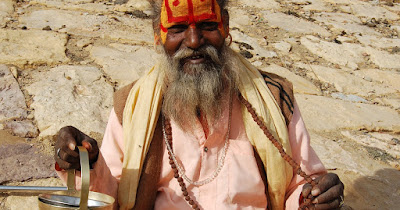Responsible Traveler Kit II: how to impact culture as little as possible?
 |
| Tourist «Show» in Peru. We saw them dressed in T-shirts a few minutes before. |
It happened to us in Peru. We hired an excursion to see the jungle of Iquitos and they told us that we would visit "a community that lives in isolation and that has preserved its ancestral customs until today." When we were arriving by canoe, we saw how a boy dressed in a T-shirt was running to warn the rest. we arrived and the same boy was dressed in a kind of "skirt" made from nearby plants and had his face painted. They danced a “traditional dance” for us. They showed us how they hunted with a few picks. It was one of the most embarrassing moments of our lives: we knew that all this was a "show" for tourists (and then, of course, they were going to ask us for a tip). Has it ever happened to you?
Although we don't realize it, the massive arrival of tourists to countries of the South affects culture, customs and way of life of the people who inhabit them. The most common consequences are:
1 Loss of cultural identity
It usually occurs when local communities imitate newcomers and change their values (often based on family, religion or community), by others more hedonistic and consumerist. If we are not respectful of the cultures we visit, it is not difficult for that to happen!
 |
| The massive arrival of tourists causes changes in the local culture and society. |
2 Abandonment of traditional professions
Faced with the massive arrival of visitors, the local population often suddenly abandon their traditional work as fishing, agriculture and livestockto engage in tourism. It is much more profitable, especially if the standard of living of the tourists is higher than yours! As many festivals and traditions are linked to these professions, they end up being lost.
3 Gentrification
The arrival of tourists affects the rise in prices, especially in housing. In this way, gentrification arrives: the original population is displaced by people with a higher purchasing power, since they cannot pay the new prices.
An example of gentrification is the center of Cusco. There some of these rentals reach $5,000 per month!
 |
| Dances in Cambodia. Will they be transformed to please tourists? |
4 Culture becomes a business
Music and dance; traditional ways of dressing; traditions; rituals or festivals... Suddenly they stop being an element of the daily life of many people and become a business, since they attract tourists. But they are not kept as is, but rather They usually adapt to the expectations and tastes of the tourists.
 |
| In Bolivia, llamas are decorated to attract the attention of tourists. |
5 Tips to minimize your impact!
- Before you travel, soak up the culture of the country you are visiting! It is the only way to understand the people you are going to meet and to detect when your presence is altering their way of life.
- Try to adapt to local uses and customs without imposing your habits. Establish correct relationships without prejudice or previous stereotypes. Listen, listen and listen.
- Don't contribute to gentrification. Try not to stay in the "tourist heart" and do not pay extortionate prices for accommodation. Eat at local restaurants and not at “tourist” western food joints.
- Support traditional professions. Buy local crafts. Eat at the market, where farmers and ranchers sell their wares.
- If you see a "show" for tourists, do not contribute to it! Kindly tell whoever takes you there that you are not interested in this type of entertainment and that you would rather go somewhere else.
 |
| Beware of false sadhus (ascetics) in India! |
In Tumaini we work to promote responsible tourism and solidarity travel. Do you dare to travel with us? 😉




Wilmary Villarroel
Very good tips. Practical when traveling to a completely foreign continent. For example, I live in South America, and I hope to travel to Europe at some point. We have very different cultures, especially in terms of warmth towards tourists. That is why I like to read this type of articles that help me show a behavior according to each culture. Greetings.
Source: nemo blog